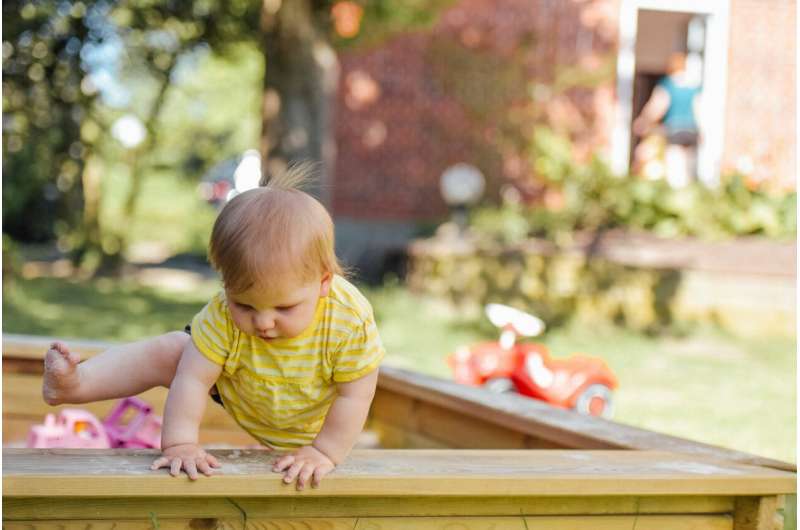This article has been reviewed according to Science X's editorial process and policies. Editors have highlighted the following attributes while ensuring the content's credibility:
fact-checked
trusted source
proofread
Toddlers, tech and talk: Report explores how children under three use technology

A major study, the first of its kind, has revealed key insights into the extent to which children under 3 years old have access to digital technology in the home, how they use it and how it supports their language development.
It reveals that children are born into hugely technologized homes—98% of the families who took part in the study's online survey had access to a smartphone and the same proportion have Wi-Fi connectivity.
Almost all families in the study (92%) reported they have a television/smart television and over 80% have laptops and/or tablets.
The research also captured the wide range of tech in the home that children interact with, including smart devices (such as smartphones, smart speakers), interactive toys, audio players and even domestic appliances (smart refrigerators and touch sensitivity control panels).
"Toddlers, Tech and Talk," led by Manchester Metropolitan University, is the first in-depth report about tech in the home lives of children from birth to 36 months. It was carried out with Lancaster University, Swansea University, Queen's University Belfast and the University of Strathclyde.
Rosie Flewitt, Professor of Early Childhood Communication at Manchester Met, said, "Official statistics and discussions in society often assume that very young children don't use digital media. Our research shows that this is not the case. Our findings offer much needed insights into very young children's interactions with a range of digital technology at home."
Other key findings include:
- The vast majority of parents agree that tech offers children opportunities to develop skills with numbers (83%), reading (75%) and creative skills (75%), and most disagree that they harm learning.
- Many parents believe digital devices can be damaging to young children's physical health (47%) and mental health (49%).
- The majority of parents (81%) believe digital technology offers opportunities for young children to have fun.
- Most parents feel confident in supporting their child to use devices (66%) and feel able to keep them safe online (72%).
The study included an online survey of more than 1,400 parents across the U.K., interviews with parents and early years professionals, as well as 40 intensive case studies in family homes.
Professor Flewitt added, "Parents are highly aware of opportunities and tensions around their children's use of digital technology. They balance beneficial opportunities for their children to communicate with others, play and learn, with concerns over possible damaging effects of overuse."
The study highlights the many different ways that parents use technology with their children, such as looking at photographs and videos, taking photographs, watching programs, playing music, making digital paintings and listening to stories.
Many very young children also watch videos and take photos by themselves, with some also playing digital games on their own, including number and phonics learning apps.
The study offers further insights into how technology can offer rich opportunities for very young children's language development, such as listening and singing along to songs and nursery rhymes, watching and talking about much-loved TV characters with their parents or siblings and talking with family on video calls.
Professor Julia Gillen, from Lancaster University, said, "Many families think of creative ways of supporting their children's language development.
"For example—we found some parents using smart speakers to practice animal sounds with their babies while changing nappies or encouraging toddlers to sing nursery rhymes.
"One common misunderstanding is that digital technology causes children to sit passively, but we found that they often respond to videos by dancing or engaging in rhythmic movements.
"Many young children are learning elements of sign language from a very popular YouTube channel and this can be very useful to them when they start going to nursery school."
Parents who took part in the study agreed that the digital experiences of the youngest children in society have been relatively overlooked, and that adults need richer information on good practice.
More information: Rosie Flewitt et al, Toddlers, Tech and Talk: summary report. DOI: 10.23634/mmu.00636881
Provided by Lancaster University




















